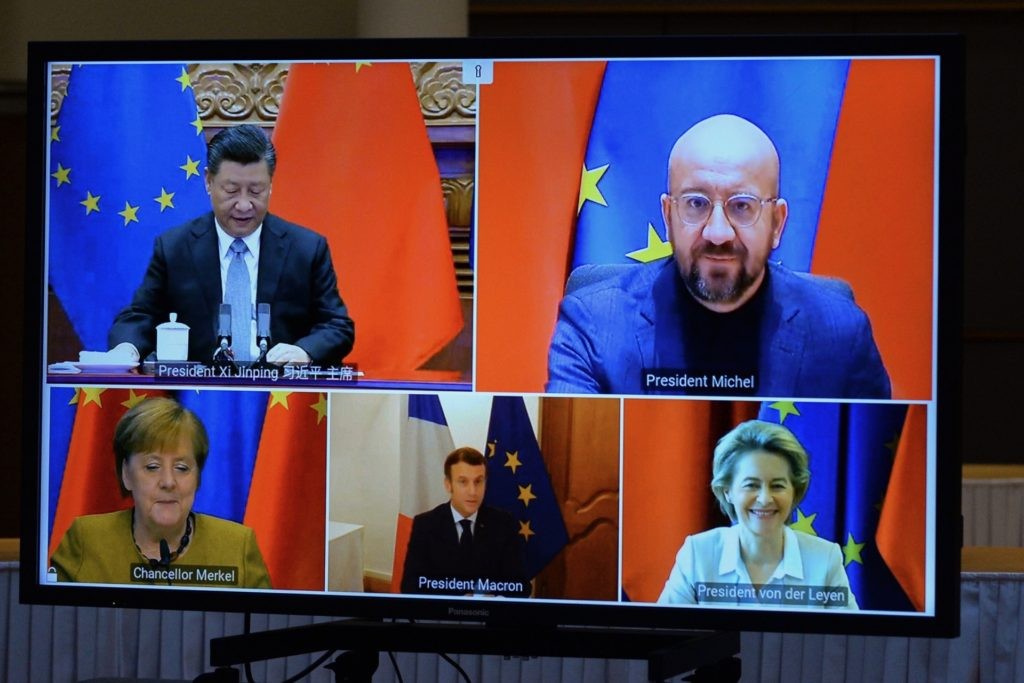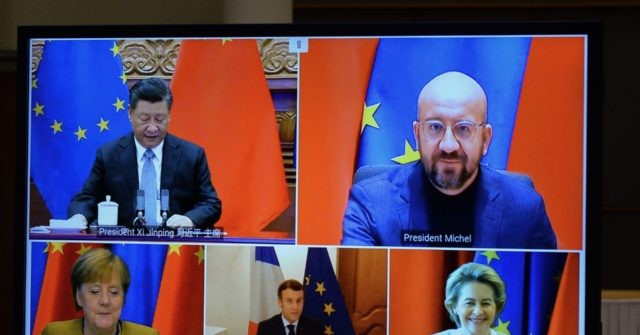

The European Union’s investment pact with the Chinese Communist Party (CCP) has been characterised as a “real setback for the free world” by the founder of Hong Kong Watch, as human rights campaigners, diplomats, and others chastise the bloc for cosying up to the dictatorship in Beijing.
The EU-China Comprehensive Agreement on Investment (CAI) was signed in principle last week, following claims of concessions from the communist regime in Beijing. The deal, which has been characterised as the first stage of cooperation between the bloc and China, is said to pave the way for €120 billion in trade.
The European Commission has described the deal as the “most ambitious agreement that China has ever concluded with a third country”.
One of the claimed concessions made before the signing of the agreement from China was to “work towards” implementing International Labour Organization conventions which prohibit the use of slave labour and set out rights for labour unions.
The idea that the Chinese Communist Party will live up to the goal of abolishing slave labour appears to stand in direct contradiction to actual CCP policy, however, as the country has been accused of building factories in at least 135 concentration camps in the Xinjiang region, alone.
In September, the CCP began to rebrand the forced labour in Xinjiang as “facilitation of employment” and has accused the United States of seeking to impose “forced poverty” on the region, by opposing the enslavement of the native Uyghur population.
Video filmed secretly inside China documents the use of 20,000 concentration camp detainees as forced labor. https://t.co/tPdhGdLYMs
— Breitbart News (@BreitbartNews) October 25, 2020
The EU investment pact with China has drawn widespread criticism amongst human rights campaigners, diplomats, and even typically globalist-minded media outlets.
In comments made to Breitbart London, the chairman and founder of the UK-based think tank Hong Kong Watch, Benedict Rogers, described the deal as “a real setback for the free world”.
“Just at a time when people are finally waking up to the dangers of the CCP, after a year in which the whole world has suffered a global pandemic caused, at least in part, by the CCP’s mendacity and repression, and at a time when increasingly experts are accusing the CCP of committing genocide against the Uyghurs, now is not the time to be doing such deals, especially without any human rights safeguards in them,” Rogers said.
“The European Parliament passed a motion in December calling for access to the camps in Xinjiang, sanctions, and saying that no investment treaty should be struck which didn’t include China ratifying human rights conventions, especially the convention on forced labour, and then the European Commission rams through this deal within days despite the European Parliament’s wishes.
“It’s a travesty, a betrayal of the EU’s values, and a threat to the security of European member states,” the Hong Kong Watch founder concluded.
SHOCK: China is likely using lungs taken from living political prisoners to treat coronavirus patients, a doctoral researcher said, confirming revelations by a Chinese labor camp survivor during an event on Capitol Hill Tuesday. https://t.co/aZNugPX9np
— Breitbart News (@BreitbartNews) March 12, 2020
The European Union has defended its decision to plough through with the deal by likening the supposed concessions from China made in the EU agreement with the “phase-one” trade deal signed by the Trump administration. Brussels has argued that the deal represents the bloc’s “strategic autonomy”.
In an opinion piece for the globalist, establishment newspaper, the Financial Times, Gideon Rachman said that the European Union’s claims that the deal will “discipline the behaviour” of the communist regime are in fact “naive”.
“It is naive to believe that China will respect the agreement it has signed. It is naive to ignore the geopolitical implications of doing a deal with China right now. And it is naive to think that the darkening political climate in Beijing will never affect life in Brussels or Berlin,” Rachman wrote.
“Beijing’s promise to ‘work towards’ enforcing international conventions on labour standards are also laughably weak,” he added.
Farage: China is ‘Licking its Chops’ at the Thought of a Biden Presidency https://t.co/63je1UHJ8X
— Breitbart London (@BreitbartLondon) December 1, 2020
The EU-China Comprehensive Agreement on Investment came following seven years of negotiations. Two factors are said to have played a critical role in the signing of the deal, namely China’s desire to ink a deal before President-Elect Joe Biden assumes the White House and a push from German Chancellor Angela Merkel to secure a deal prior to the end of Germany’s term as the head of the EU presidency in December.
The deal — which was not done in consultation with the United States — is seen as a big diplomatic loss for the incoming Biden administration, which had promised to develop closer ties with the EU to counteract the rise of China as opposed to President Trump’s tougher unilateral approach.
Prior to the signing of the agreement, Mr Biden’s national security advisor, Jake Sullivan, had said that the administration would “welcome early consultations with our European partners on our common concerns about China’s economic practices”.
Germany has become increasingly tied with the communist regime, with China becoming the country’s largest trading partner in 2018, with some €200 billion in trade. Merkel has argued that closer ties with China are the only way for the world to solve pressing issues, such as supposedly man-made climate change.
With Merkel set to resign later this year, and France to take the reigns of the EU presidency in 2022 — when the deal is expected to be officially ratified by member states and the European Parliament — some smaller countries in the bloc have expressed worries that they are being steamrolled by the two major economic players in the Union.
Merkel Makes Clear That Germany Will Not Help U.S. in China Trade Fight https://t.co/mD8I0wy1gu
— Breitbart London (@BreitbartLondon) January 17, 2020
One EU diplomat told POLITICO: “There’s a lot of frustration among smaller countries about the way the Commission has been used to push through one of Merkel’s pet projects at the end of her term and the end of her legacy.”
“Is this the way the EU will work post-Brexit? The Brits are just out and we’re already missing their open market-oriented approach,” the diplomat went on to say, adding: “If Germany weighs in too much, smaller EU countries have nothing to say.”
Hong Kong Watch Founder Benedict Rogers told Breitbart London that the failures of the European Union to meaningfully take on the atrocities of the communist regime will leave a vacancy in leadership that the United Kingdom should take up post-Brexit.
“Now that the UK has left the EU, it must play a leadership role among democracies in championing human rights and countering the dismantling of freedom in Hong Kong, the genocide of the Uyghurs and the intense repression of religious believers, civil society, lawyers, bloggers, citizen journalists, whistleblowers, and dissidents in China,” Rogers said.
“It is time for the UK to work with others across the free world to build an alliance of democracies to defend liberty and counter the CCP’s repression and aggression.”
Exclusive Video: Hong Kong Watch Founder Says UK Has a Responsibility to Take Lead, Call for Sanctions on China https://t.co/nSfXTkGfqE
— Breitbart London (@BreitbartLondon) November 24, 2019
Follow Kurt Zindulka on Twitter here: @KurtZindulka
 RSS Feed
RSS Feed















 January 5th, 2021
January 5th, 2021  Awake Goy
Awake Goy  Posted in
Posted in  Tags:
Tags: 













